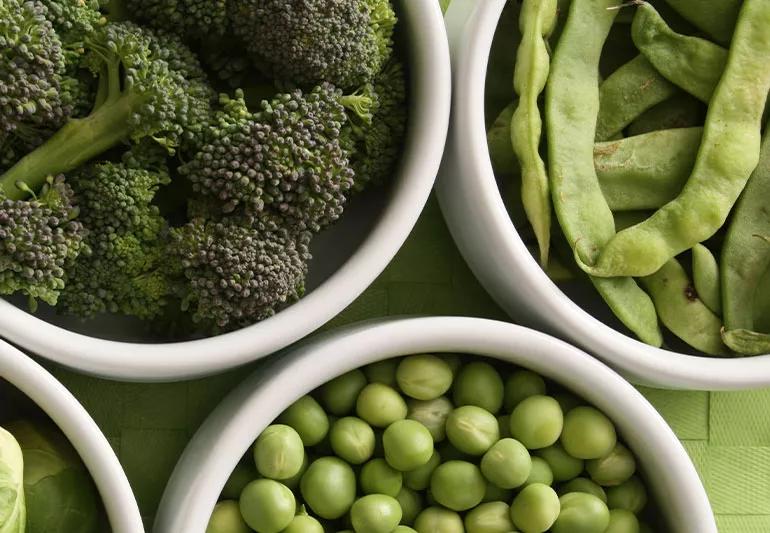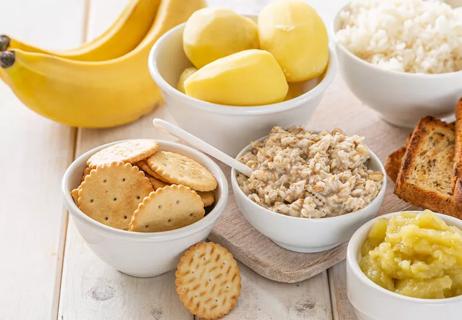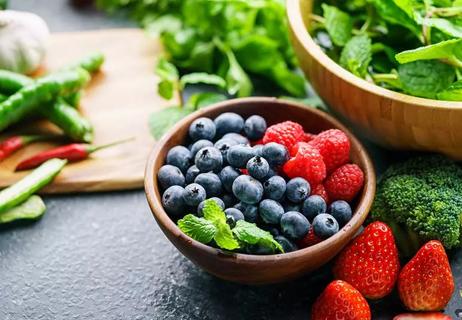Slow-to-digest food can lead to a gas buildup

All that’s left of dinner are a few crumbs on your plate … and that’s when the feeling hits. Your suddenly bloated belly seems like it’s about to explode. Uncomfortable barely begins to describe your condition.
Advertisement
Cleveland Clinic is a non-profit academic medical center. Advertising on our site helps support our mission. We do not endorse non-Cleveland Clinic products or services. Policy
So how did you get to this point? Consider those crumbs clues, says registered dietitian Beth Czerwony, RD. “It all starts with what you eat,” she says.
The last meal you ate is sitting deep inside of your belly right now, churning and breaking down in a soup of acid and enzymes. It’s a digestive process that typically moves things along pretty efficiently.
Some food, though, tends to linger longer than it should in your winding intestinal track. Food that sits begins to decompose and ferment.
The result? “You’re going to get some gassiness,” says Czerwony.
That bloated feeling you get after eating certain foods is essentially those gasses building up internally. Basically, you’re inflating like a balloon … which can suddenly make you feel like you’re about to burst.
Absolutely, says Czerwony — and she’s willing to name names. So, here are 15 foods that can give you that swollen feeling, plus ways to maybe avoid the pain.
It’s hardly a surprise to see beans atop the list of bloat-causing foods. After all, the legendary powers of this legume have even captured the attention of lyricists: Beans, beans, the musical fruit…
Science is behind that tune, explains Czerwony. Many types of fiber-rich beans are packed with carbohydrates and — more specifically — sugars called oligosaccharides. These sugars don’t digest gently.
Advertisement
Ultimately, that process leads to fermentation and plenty of gas, which has been known to occasionally escape in a trumpet-like blast.
Tips to try: Soaking nutrition-rich beans in water ahead of mealtime can take some of the fight out of the oligosaccharides and make them easier to digest. Also, some beans (such as black-eyed peas) tend to be less demanding on your system.
Lentils are also legumes, so it’s basically the same story as beans (but without the musical acknowledgment).
Tips to try: Soaking lentils can work wonders. Also, heart-healthy lentils come in a rainbow of hues. Lighter-colored lentils tend to have less fiber than their darker counterparts, which makes them easier to digest.
Did you know that 3 out of 4 people eventually lose the ability to digest lactose, the main carbohydrate in dairy? Lactose intolerance can cause bloating and other pretty significant digestive problems.
The off-limits food list would include dairy products such as milk, butter, cheese, ice cream, yogurt and more.
Tips to try: Explore the growing selection of milk alternatives available at stores that offer many of the same nutritional and health benefits.
Guzzling down a fizzy drink puts all those bubbles in your belly. “Think about what happens if you shake a can of soda,” says Czerwony. “That’s what is happening inside of you after you drink it. The bubbles have no place to go — and it will make you feel bloated.”
Tips to try: Add a few more glasses of water to your daily routine and try to keep your consumption of carbonated beverages to a minimum.
These out-of-the-field grains are packed with fiber. But it’s worth noting that they’re high in insoluble fiber — which doesn’t break down well during the digestive process. (Insoluble fiber adds “bulk” to your poop.)
As noted, foods that don’t digest well often end up logging more time in your gut. “It’s just going to sit there and ferment, which builds those gasses,” notes Czerwony.
Gluten protein in wheat, rye and barley can also lead to digestive issues and bloating, particularly if you have celiac disease. Additionally, an estimated 6% of Americans may have a non-celiac gluten sensitivity that leads to similar issues.
Tips to try: Try grains from other parts of the farm, such as oats, that may be easier on your system. If gluten is an issue, here’s what to put in your grocery cart to avoid the troublesome protein.
These vitamin-packed produce items, part of the cabbage family, can be tough on the tummy. The list includes broccoli, Brussels sprouts, cauliflower and others. “The sugars in them make them a little more potent,” says Czerwony.
Tips to try: Raw vegetables are tougher to digest, so cooking cruciferous vegetables can limit bloating. You also may want to try different vegetables such as spinach, zucchini, cucumbers and asparagus.
Advertisement
This veggie can make you cry in numerous ways, it seems.
Onions contain a soluble fiber known as fructan, which can wreak havoc on your digestive tract. The potent root vegetable also might just pack a little more punch than some sensitive stomachs can handle.
Tips to try: Sautéed onions, anyone? Raw onions create more issues than cooked ones, so start with that if onions lead to bloating, but you want to keep this anti-inflammatory food in your diet. Onion powder is an option, too.
Pretty much the same story as onions, with fructans again serving as the primary source of trouble.
Tips to try: Cooking garlic can dull the bloating effects while allowing you to gain many of the health benefits offered by the herb-like vegetable. Don’t be afraid to explore the rest of your spice rack, too!
The sugars, or fructose, that make these readily available fruits so tasty can complicate digestion and lead to bloating. Apples and pears can also be high in hard-to-process fiber if you eat the skin.
(On a side note, apples can also aid digestion by limiting constipation. The key here is moderation.)
Tips to try: Peeling the fruit can help, as can cooking it. Fruits such as bananas, berries and citrus are less apt to lead to bloating, too.
Advertisement
The first word in the above description signals the problem: “Your body responds best to food that is natural,” says Czerwony. “If something is artificially made, your body has more trouble processing it.”
Tips to try: Lean on natural sweeteners such as honey, agave nectar, monk fruit or maple syrup. If you have diabetes and are looking to avoid natural sugars, try the plant-based sweetener stevia.
Who doesn’t love a perfectly grilled steak? Or a thick, juicy burger? Or a kielbasa? Well, your gastrointestinal (GI) tract may not be the biggest fan.
Higher-fat foods such as beef, pork and just about anything that has been fried can take a while to break down in your belly. That’s why you often feel stuffed for a long, long time after downing a fatty dish.
Tips to try: Try limiting fast food meals and meat consumption.
Beer is carbonated, which — as previously mentioned — can lead to bloating. It’s also made with hard-to-digest grains such as wheat and barley (also noted previously). Plus, it’s alcohol, which has its own set of digestive issues.
Add it all together and your odds of a swollen belly seem pretty high.
Tips to try: Wine or spirits are less apt to cause bloating if you feel the need for an adult beverage.
Advertisement
It’s not just what you eat that can cause bloating. How you eat and how much you eat also plays a role. To keep your belly from feeling swollen, Czerwony offers this advice:
If you’ve already made some choices that left you bloated, don’t worry: The feeling will pass. “It might be a good idea to go for a walk, though,” recommends Czerwony. “If you start moving, that food will start moving, too.”
You also might want to consider changing your shopping list to include some of these foods that can help reduce bloating.
Learn more about our editorial process.
Advertisement

Gallstones can block bile in your biliary system and lead to pain and discomfort

Peppermint oil, exercise and a belly massage can help, but for ongoing symptoms, you may need to talk to a healthcare provider

Opt for soft foods or liquids that are rich in protein, calories and vitamins

Delivered through an IV, options can include chemotherapy, immunotherapy or targeted therapy, or a combination

Irritable bowel syndrome has many signs, but lower abdominal pain, constipation and swelling may mean you should see a healthcare provider

Help your aching belly by staying hydrated, eating bland foods and avoiding certain foods

Hunger is the obvious cause, but food quality, and lack of protein and water are also key

Different symptoms call for different menus

The tropical fruit is a good source of antioxidants and vitamin C

Most people fall asleep within 10 to 20 minutes, but if your experience is different, adjusting your sleep schedule may help

Exploring your hidden side can lead to better understanding of what makes you tick